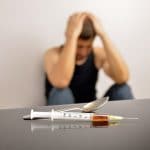- Effects Of Heroin
- Signs Of Heroin Addiction
- Heroin Withdrawal Symptoms
- Heroin Addiction Treatment
- FAQ
Heroin is an opiate made from the opium poppy plant. You can find it as a white or brown powder or a black sticky substance (black tar heroin). A highly addictive drug, heroin was involved in over 14,000 overdose deaths in 2019.
But there is hope for people who struggle with heroin abuse and addiction. Substance abuse treatment programs—such as those offered by Northeast Addictions Treatment Center—can help you or a loved one heal from the devastating effects of heroin.
Effects Of Heroin
When you use heroin, it activates opioid receptors throughout your body that increases the dopamine in your brain. Dopamine is a hormone that makes you feel pleasure, which reinforces the use of heroin.
As a central nervous system depressant, heroin slows down your breathing and heart rate, which can ease anxiety and make you feel relaxed. But heroin can cause a lot of short-term and long-term adverse effects as well.
Short-Term Effects
Short-term effects of heroin include:
- flushing
- dry mouth
- nausea
- vomiting
- itching
- foggy thinking
- heaviness in limbs
A prolonged period of heroin use can damage your physical and mental health.
Long-Term Effects
Some long-term effects of heroin are:
- liver disease
- kidney disease
- pneumonia, tuberculosis, or other lung problems
- clogged blood vessels from additives
- constipation
- stomach cramps
- changes in menstrual cycle (women)
- sexual dysfunction (men)
- insomnia
- mental disorders (like depression)
- impaired decision-making skills
- lack of behavioral control
Different methods of heroin abuse come with additional risk factors. If you snort heroin, it can damage or destroy your nasal tissue, ruining your senses of smell and taste. Heroin injection can lead to collapsed veins, abscesses (swollen, pus-filled tissue), and heart infection (endocarditis).
Under the influence of heroin, you may not have the best judgment. You’re more likely to engage in risky behavior such as unprotected sex or sharing needles. Using dirty heroin paraphernalia, such as needles, can spread infectious diseases like HIV and Hepatitis C.
Learn more about the Effects Of Heroin On The Body
Signs Of Heroin Addiction
Heroin addiction can take over your life. When you’re in it, it’s hard to hide. But if a loved one is struggling with addiction, it may take some time for you to pick up on it. Knowing the signs can help.
Signs of heroin addiction include:
- distancing from family and friends
- financial issues from buying heroin
- borrowing or stealing money to pay for drugs
- losing interest in things you once loved
- spending a lot of time getting, using, and recovering from heroin
- needing heroin to get through the day
- often seeming sedated
People who abuse heroin heavily may go “on the nod,” a state in which they drift between consciousness and semi-consciousness.
Heroin Overdose
Another sign of addiction is heroin overdose, which may be indicated by:
- blue skin or nails
- slowed or stopped breathing
- loss of consciousness or coma
A heroin overdose can be deadly. If your friend or family member overdoses on heroin, it’s possible that they’re addicted to the drug.
They may also have accidentally come across heroin laced with fentanyl (a highly potent opioid). Either way, heroin overdose is a cause for concern.
Heroin Withdrawal Symptoms
As an opioid, heroin causes physical dependence as well as a mental addiction. If you use it regularly then suddenly stop, you’ll have withdrawal symptoms. Some of these symptoms can be dangerous.
Heroin withdrawal symptoms may be:
- severe cravings
- bone pain
- muscle aches
- sweating
- sleep disturbances
- vomiting
- diarrhea
- uncontrollable leg movements
- goosebumps and cold flashes
- anxiety
- agitation
Heroin withdrawal typically starts within 24 hours of your last dose. Withdrawal symptoms are likely to be most intense in the first three days, gradually subsiding over a week or so. Some mental health symptoms, such as depression and anxiety, may linger for months.
Learn more about Heroin Withdrawal
Heroin Addiction Treatment
Heroin addiction can affect all areas of your life, so a treatment program should be comprehensive. You need to heal from substance use disorder both mentally and physically.
Treatment may begin with detox to rid your body of drugs before therapy begins. Once you’re safely through the withdrawal process, you can engage in a combination of therapies that target your unique needs.
Some heroin addiction treatment options are:
- contingency management (rewarding sobriety with cash or vouchers)
- one-on-one counseling
- group therapy
- support groups
- medical care
- yoga
- exercise
- meditation
- recreation
- nutritional support
Medication-Assisted Treatment
Medication-assisted treatment (MAT) is effective for some people with heroin addiction. In MAT, you receive a medication that reduces opioid cravings. Fewer cravings mean you can focus on therapy sessions rather than thinking about how much you want to use heroin.
MAT medications for heroin include methadone, Suboxone (buprenorphine/naloxone), and Vivitrol (naltrexone). Some substance abuse treatment centers only offer one option, while others may prescribe a medication that fits best in your treatment plan.
To learn more about heroin abuse and addiction treatment options, reach out to a behavioral health specialist at Northeast Addictions Treatment Center today.
FAQ
What Does Heroin Look Like?
Heroin is an opioid that comes in various textures and colors. For instance, the purest form of heroin is a white powder.
However, heroin can come in dark brown or black colors. Black tar heroin is a common slang term and can be sticky compared to the white or brown powder substance.
To learn more, read What Does Heroin Look Like?
What Does Heroin Smell Like?
Pure heroin has little to no odor. Street heroin, however, has a chemical smell or an acidic scent like vinegar, depending on the details of its production, condition, and purity.
To learn more, read What Does Heroin Smell & Taste Like?
How Long Does Heroin Stay In Your System?
How long heroin stays in your systems depends on various factors including age, weight, and how long you’ve been using the drug. It also depends on the type of drug test.
Blood and saliva tests can detect heroin metabolites for up to an hour after last use. Urine tests can detect heroin metabolites for up to 48 hours after last use, while hair follicle tests can produce positive results for as long as 90 days later.
Learn more about types of Drug Tests & Heroin Detection Times
What Is Gray Death?
Gray Death is an opioid combination drug that contains numerous synthetic opioids, including fentanyl and carfentanil. Carfentanil, an animal tranquilizer, is about 10,000 times more potent than morphine.
These opioids are extremely dangerous and even a small amount can cause a fatal overdose.
Learn more about Gray Death
What Is Black Tar Heroin?
Black tar heroin is a type of heroin characterized by its sticky feel and black or dark brown appearance. It is likely abused by inhaling or injecting it.
Learn more about Black Tar Heroin
Can You Smoke Heroin?
Yes, heroin can be smoked. The process of smoking heroin involves using the drug with aluminum foil, a lighter, and a straw.
A person places the white or brown powder on top of the aluminum foil and lights it. Once the drug begins to melt, they use the straw to inhale the drug which causes a euphoric high.
Learn more about Smoking Heroin
What Happens When You Inject Heroin?
When you inject heroin, it goes straight into your bloodstream and then brain. From there, it will create an intense rush or euphoric feeling. After that quick rush, any number of side effects can kick in such as slowed breathing, drowsiness, impaired decision-making, and overdose.
Learn more about Injecting Heroin
Can You Snort Heroin?
You can snort heroin to feel its effects quickly. Snorting heroin is a form of illicit drug use that may cause side effects like runny nose, nosebleeds, drowsiness, nasal septum perforation, and an increased risk for a heroin use disorder.
Learn more about Snorting Heroin
What Is Slang For Heroin?
The most common slang terms for heroin include:
- Dope
- H
- Horse
- Junk
- Ska
- Smack
- China White (white powder heroin)
- Brown Sugar (brown powder heroin)
- Black Tar Heroin (dark, sticky heroin)
There are also unique slang terms for heroin mixed with other drugs, such as:
- A-Bomb (heroin and marijuana)
- Dynamite (heroin and cocaine)
- Screwball (heroin and methamphetamine)
Learn more about Heroin Street Names & Slang Terms
How Much Does Heroin Cost?
Heroin is typically sold in small bags that contain about one-tenth of a gram of heroin. These bags usually cost between $5 and $20. The exact price depends on your location and the drug’s purity level.
People who live with heroin addiction often spend between $20,000 and $100,000 per year on the drug.
Learn more about Heroin Street Value & Cost
Sources
Written by
Northeast Addition Editorial Team
©2024 Northeast Addition Center | All Rights Reserved
This page does not provide medical advice.





